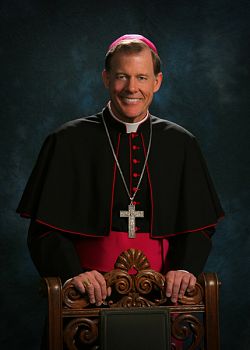Bishop Wester reflects on the Presentation of the Lord
The feast of the Presentation of the Lord on Feb. 2 has always been a favorite of mine and so I was really pleased that it fell on a Sunday this year, thus enabling more people to celebrate it. We processed through our churches with candles this past Sunday because the Presentation is a celebration of light. We read in Luke’s Gospel that Jesus is a light to all nations. We also heard Malachi speak of the refiner’s fire, developing this image of light into a transformative brilliance that changes who we are, just as gold and silver is transformed from crude ore to precious metal. Jesus Christ is our light because he is the Savior of the world who brings us from darkness to light, from sin to grace and from death to life.
In the Eastern Church, which celebrated the Presentation long before it came to the Western Church, this feast was called the feast of the Encounter or the Meeting. With this in mind, I see the light of Christ as a gift that enables us to encounter him and one another. Christ is the light that enables us to break down the walls that separate us from God and from our brothers and sisters, giving us the grace we need to be more forgiving, more selfless and more loving.
The Feast of the Presentation, then, reminds us that we need to take time for God and for one another. We need to go to our temple, the church, where each Sunday we receive the grace that helps us to encounter God and our brothers and sisters in the faith. But this encounter does not take place only at church. Rather, after each Mass we are missioned to go forth into the week and bring Christ to all those we meet by being present to them.
In particular, I see Luke’s Gospel on the Feast of the Presentation as underscoring the importance of two groups of people: the elderly and the young. It is helpful to realize that the two main characters in the Gospel narrative of this past Sunday are the baby Jesus and the elderly Simeon. The encounter between the prophet and the newborn Savior puts these two groups of persons in our consciousness and seems to say that, as we reflect on the need of encountering one another, perhaps we should begin with the elderly and the young.
I realize that it is not always possible to be present to others every moment of the day, but I do believe that in general there is a tendency in our culture to ignore and in some cases even neglect our children and our senior citizens.
As we get caught up in the busyness of our lives, it becomes an all too easy crutch to place our children in front of a television set or to give a child a computer game at a restaurant so that they will be entertained and we do not have to engage them. Likewise, it is sad to see so many of our elderly sitting alone in their rooms, whether at home or in an assisted living facility, with no one to talk to or with whom to share their stories and their wisdom. Again, I realize that we live busy lives, but it is hard to imagine what can be more important than being present to our youth and our elderly.
While recently speaking to the Pontifical Council on the Family, Pope Francis said: "Children and the elderly represent the two poles of life and are also the most vulnerable and often the most forgotten group. A society that abandons its children or marginalizes its elderly members not only carries out an act of injustice, but also sanctions the failure of that society."
Strong words, indeed!
It seems to me that one very good way of living out the Gospel for the Feast of the Presentation of the Lord would be to spend more time with the youth and elderly in my life. Quite often, I don’t have to really do much of anything – just being present is a gift in itself. Offering a listening ear, an affirming comment or an encouraging smile can go a long, long way in giving guidance to the young and companionship to the elderly.
A favorite poem of mine by Shel Silverstein drives the point home. It is called The Little Boy and the Old Man:
Said the little boy, "Sometimes I drop my spoon."
Said the old man, "I do that too."
The little boy whispered, "I wet my pants."
"I do that too," laughed the little old man.
Said the little boy, "I often cry."
The old man nodded, "So do I."
"But worst of all," said the boy, "it seems
Grown-ups don’t pay attention to me."
And he felt the warmth of a wrinkled old hand.
"I know what you mean," said the little old man.
Sadly, there are many in our society who know exactly what the little boy means, but we can change that. Pope Francis also affirmed in the speech referenced above that "… taking care of the young and the elderly is the choice of civilization."
It certainly is, and it is also the mandate of the Gospel, a mandate that comes from the lips of the Savior, who reminds us often that in loving the least of our brethren, we are loving him. We are called to bring the light of Christ to others, especially the young and elderly, placing a hand on their arms and letting them know that we know what they mean, that they mean a lot to us and that we wish to encounter them often.
© Copyright 2024 The Diocese of Salt Lake City. All rights reserved.


Stay Connected With Us